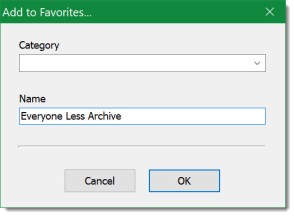“I have contacts who have no activity for years. I’m tired of seeing them in my list. What do I do?”
I have fielded this question many times over the years and the criteria for wanting to [remove] [delete] [hide] [archive] contacts varies from person to person, so for the purposes of this blog post I’ll use the word “Archive” to define the general class of contacts I do not really want to see anymore.
If you’re like me, sometimes you actually want conflicting things. For example, I can say, “I never want to see X contact again because they are no longer a part of my ministry”, and then in the next sentence say, “I want to run a lifetime report in the Contribution Report” [and that same contact had giving history 15 years ago]. If I delete that contact from my database, their history is lost as well.
This is different, of course, from these contacts with whom I am likely to never have any connection with again, and my assumption here is that these are many years past:
- A former prayer partner (no giving history) who is now deceased. The Bible seems pretty strong on the prohibition against contacting dead people!
- A referral who I presented my ministry to but who said No to partnership, does not receive my newsletter, etc.
- A referral that I received whom I was never able to reach at all
One solution is to move all of the contacts I don’t want into a separate “archive” database; that database would grow and grow over time. But that’s problematic because (a) I now have relevant/historical data in two separate places (bad for reporting and analysis) and (b) TntConnect doesn’t make that easy (I cannot just ship a contact from one database to another).
Another solution is just to delete any contact I don’t think I want anymore.
My personal philosophy is to err on the side of “not deleting”. The only contacts I have ever deleted, which probably equals about 12, are the third one in the list above: Referrals I never connected with and probably will never reach out to again.
So I how do I handle this situation?
First, I changed my attitude about contacts. When I first went into ministry, I only kept contacts who received my newsletter (financial partner or not), or for those whom I was actively cultivating. Once someone said “No”–whether they had never given or had been a financial partner before–they left my list. So my list was focused only on the “very active” person (and unfortunately I have 1000+ contacts missing from my current TNT database).
Once I started using TNT, I changed to what I call “the phone book approach”. Back in the days of the paper phone book, our local phone book was filled with all of the names in town that I needed and countless names of people I never knew. Ah, the good old days, eh? It did not bother me that this book was full of irrelevant names; I just ignored the ones I did not need. So in TNT I adopted the same thinking. Currently I have about 10 names in my database for every 1 who gets my newsletter. Another 1 of 10 (10%) may be contacts I am cultivating, while the other 80% are long past and will have no connection again.
I keep these names because I want to retain all of the history of the activity… the phone calls and appointments I went on, the gifts they may have given, and even just the fact they were referred to me by someone who cared enough to share a name.
So here’s how I handle this in TNT:
- I use the User Status field to call them “Archive”

- Lookup | By Field // User Status is not Archive

- Add Current Lookup to Favourites


- Then I chose this Favourite lookup as my Default Lookup in the Options (Tools | Options | User Interface)

This is not a perfect solution by any means. The archived contacts are only hidden when I first open TNT, not “Always hide them except when I specifically want to see them”; but I think that would be hard to program because TNT could not really know when *I* want to see an archived contact but *YOU* would not in the same circumstances.
